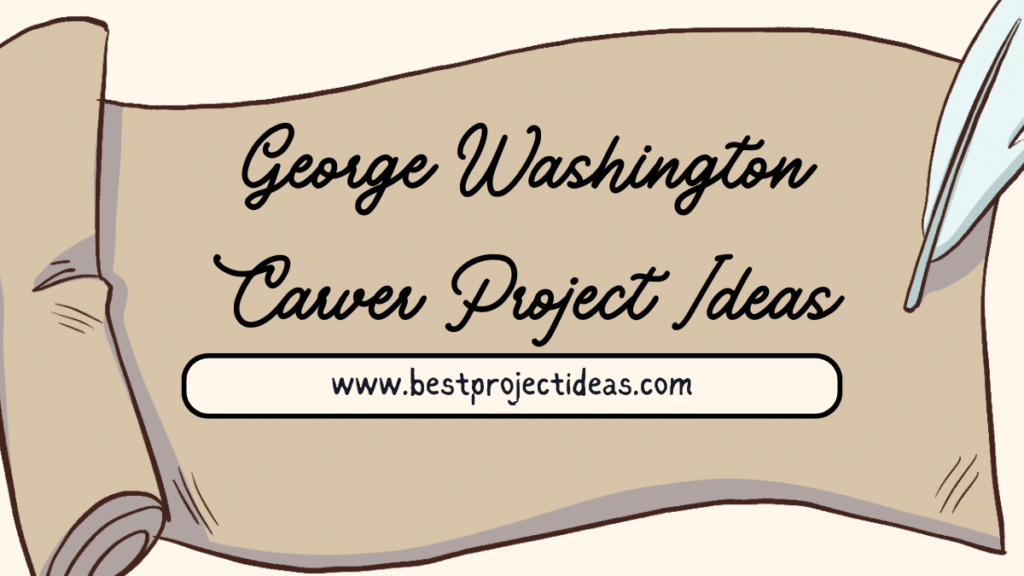
George Washington Carver was an African American scientist, inventor, and educator best known for his work with peanuts. He developed over 300 products from peanuts, including dyes, plastics, and even fuel.
He also promoted crop rotation to help farmers improve soil quality. His contributions to agriculture and science have made a lasting impact on the world.
Why Are George Washington Carver Project Ideas So Important?
Projects related to George Washington Carver are important because they help students:
- Understand his contributions to agriculture and science.
- Learn about sustainability and innovative thinking.
- Appreciate African American history and achievements.
- Develop creativity and research skills.
Must Read: Best 200 Landform Project Ideas For Students to Create!
Best 149+ George Washington Carver Project Ideas 2025-26
Here are 150 George Washington Carver Project Ideas, categorized for better understanding. Each section starts with a brief introduction before listing the ideas.
Science & Agriculture Projects
George Washington Carver was a brilliant scientist and agricultural innovator. His contributions to crop rotation, soil improvement, and plant-based products revolutionized farming. These projects explore his scientific legacy.
- Research and present how Carver improved soil quality with crop rotation.
- Create a model showing how crop rotation benefits soil health.
- Experiment with growing peanuts in different soil conditions.
- Compare plant growth using Carver’s soil enrichment techniques.
- Make an organic fertilizer inspired by Carver’s methods.
- Study the effects of nitrogen-fixing plants like peanuts on soil fertility.
- Grow and compare different crops Carver recommended for Southern farmers.
- Test homemade peanut-based plant fertilizers.
- Investigate Carver’s sweet potato innovations through a hands-on experiment.
- Research the chemistry behind Carver’s peanut-based dyes and create a sample.
- Study Carver’s work with pecans and test their growth in different conditions.
- Experiment with natural insect repellents Carver suggested.
- Analyze the nutritional value of peanuts and compare them to other legumes.
- Test different soil types for growing peanuts and document the results.
- Grow a small community garden using Carver’s sustainable farming techniques.
Invention & Innovation Projects
Carver developed over 300 peanut-based products and numerous other inventions. These projects let you explore his creativity and ingenuity.
- Create a model of Carver’s peanut-based fuel concept.
- Recreate a peanut-based adhesive similar to one of Carver’s inventions.
- Make a natural dye from peanuts or sweet potatoes.
- Develop a simple peanut oil extraction process at home.
- Experiment with making a peanut-based soap or lotion.
- Design an eco-friendly paper alternative using sweet potatoes.
- Create a product inspired by Carver’s 300+ peanut-based inventions.
- Investigate the chemistry of Carver’s peanut-based plastics.
- Make a peanut-based shampoo and test its effectiveness.
- Develop a prototype for a peanut-based rubber substitute.
- Research and recreate Carver’s method for making peanut ink.
- Try making a biodegradable material using peanut or sweet potato starch.
- Conduct an experiment on the properties of peanut oil as fuel.
- Compare peanut-based glue with modern adhesives.
- Develop an educational science kit based on Carver’s inventions.
History & Biography Projects
Understanding Carver’s life story helps us appreciate his struggles and achievements. These projects explore his biography and historical impact.
- Create a timeline of George Washington Carver’s life.
- Write a short biography on Carver’s childhood and education.
- Make a scrapbook of important events in Carver’s life.
- Research the challenges Carver faced as an African American scientist.
- Create a documentary-style video on Carver’s life and contributions.
- Compare Carver’s work with other famous scientists of his time.
- Write a play or skit about Carver’s journey from slavery to success.
- Develop an illustrated children’s book about Carver’s achievements.
- Design a digital infographic summarizing Carver’s major discoveries.
- Interview experts or read primary sources about Carver’s legacy.
- Create a “museum exhibit” about Carver’s life with posters and artifacts.
- Research how Carver influenced future scientists and inventors.
- Write an essay on Carver’s relationship with Booker T. Washington.
- Explore Carver’s role as an environmentalist and conservationist.
- Make a newspaper-style article covering a key moment in Carver’s life.
Social Impact & Civil Rights Projects
Carver’s work extended beyond science—he was a role model, educator, and advocate for African American farmers. These projects highlight his social influence.
- Write an essay on Carver’s impact on African American education.
- Compare Carver’s work with other civil rights leaders of his time.
- Study Carver’s speeches and write your own inspired by his message.
- Create a social media campaign honoring Carver’s contributions.
- Develop a lesson plan for younger students about Carver’s legacy.
- Research how Carver’s work helped Southern farmers escape poverty.
- Examine Carver’s philosophy on education and self-improvement.
- Investigate how Carver promoted agricultural self-sufficiency for Black farmers.
- Write a letter as if you were Carver giving advice to modern farmers.
- Study how Carver’s work influenced racial equality in science and education.
- Create a “Hall of Fame” poster showcasing Carver’s achievements.
- Discuss the importance of Carver’s work in a group debate or essay.
- Research Carver’s relationship with Theodore Roosevelt and Henry Ford.
- Make a comic strip about Carver’s contributions to society.
- Investigate how Carver’s work aligns with today’s sustainability movements.
Art & Creative Expression Projects
Carver was also a talented artist. These projects allow for creative expression while celebrating his legacy.
- Paint a portrait of George Washington Carver.
- Create a sculpture representing Carver’s impact on agriculture.
- Design a postage stamp featuring Carver and his work.
- Make a collage of Carver’s inventions and discoveries.
- Write and perform a poem about Carver’s contributions.
- Create a children’s storybook featuring Carver’s discoveries.
- Draw a comic strip about a day in Carver’s life.
- Illustrate a diagram of Carver’s peanut-based products.
- Design a motivational poster with Carver’s quotes.
- Create a board game based on Carver’s scientific discoveries.
- Make a short animated video explaining Carver’s work.
- Create a “Carver’s Lab” educational coloring book.
- Write a song or rap about Carver’s achievements.
- Recreate one of Carver’s paintings or sketches.
- Create an origami peanut with facts about Carver’s peanut research.
Environmental & Sustainability Projects
Carver was a pioneer in sustainable agriculture, promoting practices that are still relevant today. These projects focus on his environmental legacy.
- Design an eco-friendly garden inspired by Carver’s farming techniques.
- Research how Carver’s crop rotation methods prevent soil erosion.
- Investigate the role of peanuts in environmental sustainability.
- Create a report on Carver’s environmental influence on modern farming.
- Develop a sustainable farming plan using Carver’s principles.
- Analyze how Carver’s use of natural fertilizers impacts plant health.
- Test different types of organic mulch for improving soil quality.
- Investigate the role of Carver’s work in the context of modern environmental movements.
- Start a recycling initiative that honors Carver’s sustainability values.
- Make a model of a sustainable farm inspired by Carver’s methods.
- Compare traditional farming techniques with Carver’s sustainable practices.
- Create an educational brochure on the benefits of sustainable farming, inspired by Carver.
- Develop a rainwater harvesting system for sustainable gardening.
- Organize a community event to promote sustainable farming practices based on Carver’s work.
- Research the importance of preserving native plants and how Carver’s agricultural techniques supported them.
Educational Outreach & Teaching Projects
Carver was not only a scientist but also an educator. These projects help spread his teachings to new generations.
- Design a Carver-inspired science curriculum for elementary school students.
- Develop a set of interactive lessons explaining Carver’s farming methods.
- Create a Carver-inspired educational video for middle schoolers.
- Organize a workshop to teach children about Carver’s agricultural innovations.
- Write a children’s book that teaches kids about Carver’s impact on farming.
- Develop an interactive quiz app about Carver’s life and discoveries.
- Hold a science fair focused on agricultural innovation, with Carver as the theme.
- Create a digital timeline of Carver’s major life events for students.
- Organize a classroom debate on the impact of Carver’s work on modern agriculture.
- Start a “Carver Club” at school to promote agricultural knowledge.
- Create a board game to teach students about sustainable farming methods.
- Develop a hands-on science project showing how plants grow using Carver’s methods.
- Write a lesson plan on the importance of crop rotation and sustainable agriculture.
- Create an interactive website dedicated to Carver’s life and inventions.
- Organize a Carver-themed classroom art project (e.g., peanut-based crafts).
Community Service & Outreach Projects
George Washington Carver believed in giving back to the community. These projects help promote service to others in his spirit.
- Volunteer at a local farm and help implement sustainable farming methods.
- Organize a community gardening project inspired by Carver’s techniques.
- Partner with local farmers to create educational workshops about Carver’s methods.
- Help a local school start a vegetable garden using Carver’s agricultural methods.
- Raise funds to create a community garden that supports local farmers.
- Organize a “Peanut Day” event to teach others about Carver’s work.
- Provide free seeds and gardening supplies to low-income farmers, inspired by Carver.
- Help local youth develop small-scale farms or gardens at their schools.
- Create a food drive focusing on peanut-based products, in honor of Carver’s work.
- Organize a community cleanup event, promoting sustainable practices like Carver’s.
- Start a food bank that focuses on healthy, locally-grown produce inspired by Carver’s farming practices.
- Volunteer to teach children about Carver’s inventions and their everyday applications.
- Work with local farmers to promote the use of organic fertilizers and crop rotation.
- Host a series of workshops for local farmers on eco-friendly, sustainable practices.
- Create a volunteer network to help teach Carver’s agricultural techniques to others.
STEM & Technology Projects
Carver’s work had a profound influence on science and technology. These projects allow you to explore the intersection of agriculture and technology.
- Develop a mobile app to track crop growth using Carver’s farming methods.
- Design a website that educates people about Carver’s scientific innovations.
- Create a digital tool for farmers to calculate optimal crop rotation schedules.
- Build a small automated system that simulates Carver’s agricultural techniques.
- Research the technology behind Carver’s peanut-based products and test modern equivalents.
- Create a simulation program to demonstrate the effects of different soil treatments.
- Experiment with creating biodegradable materials using Carver’s peanut-based ideas.
- Develop a virtual reality experience where users can experience farming in Carver’s era.
- Use drones to monitor crops, inspired by Carver’s interest in improving farming techniques.
- Research modern-day applications of Carver’s agricultural inventions using technology.
- Build a small irrigation system inspired by Carver’s sustainable farming ideas.
- Create a digital crop rotation planner that follows Carver’s methods.
- Design a smart farming system inspired by Carver’s principles of natural growth.
- Develop a computer program that simulates the growth of crops using Carver’s techniques.
- Use data analysis to compare modern farming with Carver’s methods.
Public Awareness & Advocacy Projects
Carver was an advocate for the education and upliftment of African Americans and the improvement of agricultural methods. These projects raise awareness about his work.
- Create an advocacy campaign to highlight Carver’s contributions to agriculture.
- Design a public poster campaign to spread awareness about Carver’s inventions.
- Write a persuasive speech encouraging schools to teach Carver’s life and work.
- Start a petition to create a Carver National Monument.
- Develop a website that celebrates Carver’s impact on modern science.
- Organize an event at your school or community center dedicated to Carver’s work.
- Host a fundraising event to raise money for agricultural education programs.
- Create a social media challenge to spread knowledge about Carver’s innovations.
- Research how Carver’s work is still relevant today and present it to a group.
- Create a public exhibition dedicated to Carver’s life, similar to a museum.
- Write a letter to your local congressperson advocating for agricultural education in honor of Carver.
- Start a local community group to promote the study of agricultural science inspired by Carver.
- Organize a Carver-themed agricultural conference for students.
- Produce a podcast or YouTube series on Carver’s legacy and influence.
- Launch a scholarship in honor of Carver’s contributions to education and science.
How to Make a George Washington Carver Project
Creating a project about George Washington Carver can be fun and educational. Here are some simple steps:
- Choose a Topic – Decide what aspect of Carver’s work interests you the most (e.g., inventions, agriculture, education).
- Do Research – Use books, online resources, and videos to gather information.
- Select a Project Type – Will you make a model, write a report, create a poster, or do an experiment?
- Gather Materials – Depending on the project type, collect necessary items like paper, glue, soil, plants, or peanut-based products.
- Work on the Project – Write, build, or conduct experiments to bring your project to life.
- Present Your Work – Share your findings through a presentation, display, or report.
Benefits of Doing a George Washington Carver Project
- Encourages scientific thinking and innovation.
- Teaches the importance of sustainability and agriculture.
- Helps students develop presentation and research skills.
- Honors an important historical figure in American history.
Tips for Choosing the Best Project
- Pick a topic that excites you.
- Consider available materials and time.
- Make it interactive or hands-on for better learning.
- Ensure the project is educational and informative.
Conclusion
George Washington Carver’s work continues to inspire students, scientists, and environmentalists.
By working on a project about him, you not only learn about history and science but also develop creativity and problem-solving skills.
Choose a project that excites you and have fun learning about this incredible scientist!

